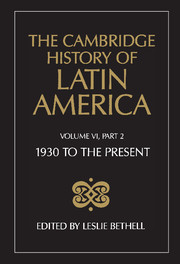8 - The Catholic Church in Latin America since 1930
from Part Four - Church
Published online by Cambridge University Press: 28 March 2008
Summary
INTRODUCTION
The Catholic Church dominated the religious and cultural life and was a major influence in the political and economic life of Latin America during 300 years of colonial rule. In the nineteenth century, following independence from Spain and Portugal, freemasons, liberals and positivists in the new states challenged the Church’s exclusive ideological claims and forced it on to the defensive. The secularization of the State and its absorption of liberal and anti-clerical influences, together with the confiscation of Church properties and the introduction of lay education, civil marriage and burial weakened the power of the Catholic Church, economically and socially as well as politically. As the State shed much of its conservative and Catholic past, so the Church was compelled to diminish its hitherto heavy reliance on the State and to look to its own resources and institutions. New challenges were posed in the first decades of the twentieth century by explicitly atheistic versions of anarchism and socialism. Free-thinking was a powerful force among urban intelligentsias; and the process of urbanization was frequently accompanied by a growth of religious indifference among all social classes.
During the papacies of Pius XI (1922–39) and Pius XII (1939–58)–and it is important always to remember that the Catholic Church is an international institution organized from Rome—the Church began to establish connections with new socio-political forces—industrial, bureaucratic, nationalist and popular—which, for lack of power, themselves needed allies. The Church, for the most part antiliberal and also now fiercely anti-communist, abandoned the defensive posture acquired during the liberal ascendancy, and placed its relationships with the state and civil society on a new basis.
- Type
- Chapter
- Information
- The Cambridge History of Latin America , pp. 545 - 582Publisher: Cambridge University PressPrint publication year: 1995



